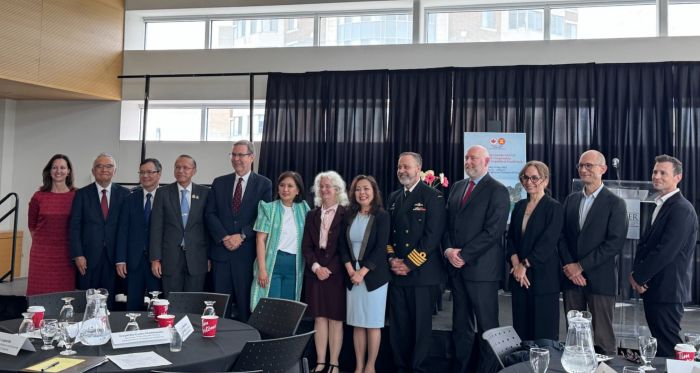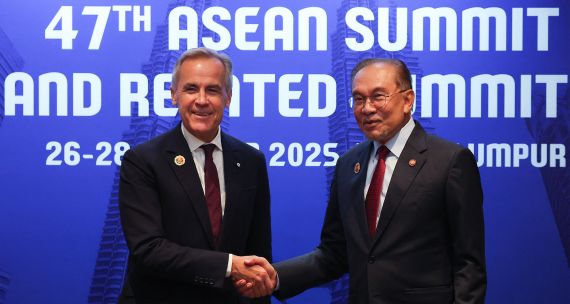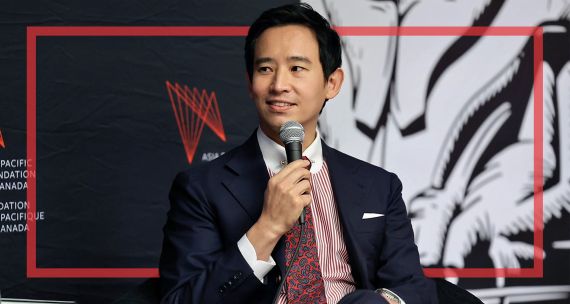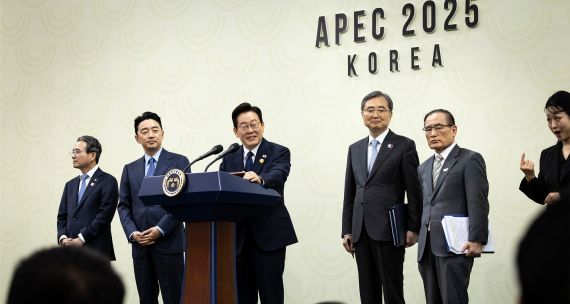A symposium on deepening security co-operation between Canada and the Association of Southeast Asian Nations (ASEAN) took place in Ottawa on May 15, 2025. It was organized by the York Centre for Asian Research’s Canada-ASEAN Initiatives and held at the University of Ottawa’s Telfer School of Management, with support from the Asia Pacific Foundation of Canada (APF Canada).
APF Canada’s Vice President, Research & Strategy, Vina Nadjibulla, and Professor Kai Ostwald, an APF Canada Senior Fellow, were panellists for a session on how Canada’s new government might position itself in relation to Southeast Asian security. Julia Bentley, an APF Canada Distinguished Fellow and former high commissioner to Malaysia (2017-20), moderated the ambassadors’ panel.
Other speakers included an assistant deputy minister and senior representatives from Canada’s Department of National Defence (DND), Global Affairs Canada, and Department of Fisheries and Oceans (DFO), as well as think-tank and university representatives. Canada-based ambassadors of the Philippines, Thailand, Vietnam, and Japan also participated.
Building on the success of the first symposium in 2024, this year’s discussion was set against the backdrop of growing geopolitical turmoil, flux, and uncertainty and included a lively debate on how Canada’s new government might engage in regional security in Southeast Asia. A major theme was whether Canada could capitalize on the strategic vacuum created by the U.S.’s retreat from both Asia and from multilateralism, and whether it could reframe itself as reinforcing the rule of law, the multilateral system, and regional leadership, provided it can articulate its desired role in a coherent narrative.

Canada’s interest in ASEAN remains firm
Keynote remarks underlined the importance Canada places on its close relationship with ASEAN, Canada’s position as a Pacific nation, and its contributions to security in the Indo-Pacific. Examples include Ottawa’s active engagement in the ASEAN Regional Forum’s (ARF) Defence Officials’ Dialogue and Security Policy Conference, and its co-chairing of workshops on topics such as Women, Peace and Security, and the UN Convention on the Law of the Sea. Canada is also actively involved in the ASEAN Defence Ministers’ Meeting Plus (ADMM-Plus) processes as an observer to two Expert Working Groups — one on humanitarian assistance and disaster relief and the other on maritime security.
In addition, Canada is advancing collective security with key ASEAN partners through bilateral agreements and the Canada-ASEAN Work Plan (2026-30) and delivering on its commitments to the ARF and through the implementation of its 2022 Indo-Pacific Strategy (IPS). This is reflected in the steady tempo of visits by senior Canadian officials — e.g. Vietnam, Malaysia, and the Philippines — and defence policy dialogues in 2025 with Indonesia, Singapore, and the Philippines. Half of Canada’s security training partners are now from ASEAN.
Through initiatives such as Operation Horizon and Operation Neon, Canada contributes to upholding international law in the Indo-Pacific, including in the South China Sea, with increased naval presence and flight surveillance.
Canada also collaborates with ASEAN partners on other areas of maritime security through enforcement, capacity-building, and the Dark Vessel Detection program. These efforts build on decades of Canadian involvement in the Pacific and include a growing role for Canada in the North Pacific Guard. Canadian personnel, technology, vessels, and aircraft all support information-sharing, monitoring, protection, prevention, and the management of criminal activities at sea, including those related to fisheries, narcotics, and human trafficking, resulting in better compliance with fisheries, labour, and environmental regulations.
Balancing regional engagement and perception
Ensuring continuity in Canadian policy toward ASEAN and sustaining the commitments it has made in its IPS were recurring points of discussion throughout the symposium. While there have been some gaps in IPS implementation, participants said that reducing the emphasis on the IPS now would have high reputational costs for Canada in Asia. Participants also acknowledged, however, that the term ‘Indo-Pacific’ is increasingly loaded as a framing for U.S.-China rivalry. Canada needs to articulate its overall foreign policy, rooted in Canadian interests and values, and advance its own uniquely Canadian narrative through platforms such as the G7 leaders’ summit — hosted this year by Canada — to show alignment among its Indo-Pacific, Euro-Atlantic, and Atlantic priorities.
Panellists warned that emulating the U.S.’s muscular posture or appearing to be part of an anti-China alliance would undermine Canada’s credibility vis-à-vis Southeast Asia. Canada’s security engagement should not be anchored solely to is relations with the U.S. Moreover, the term ‘like-minded’ should expand beyond ideological alignment to include pragmatic middle powers, such as those in Southeast Asia, that try to navigate geopolitics pragmatically.
Recognizing that regional instability is part of a larger pattern of global disruption, panellists emphasized the importance of talking to China to avoid miscalculation. The meeting of Canadian and Chinese defence ministers in 2024 on the margins of the annual Shangri-La Dialogue in Singapore — the first such meeting in 11 years — was a positive signal in that regard. Like ASEAN, Canada lives next to a powerful neighbour, and both Canada and ASEAN can benefit from sharing insights on how to navigate their respective neighbourhoods.
How should Canada’s new government position itself vis-à-vis Southeast Asian security?
Amid the growing geopolitical churn, the rise of ‘minilateral’ groupings in Asia’s shifting security architecture prompted discussion on the pros and cons of Canada joining flexible and issue-specific coalitions. Participants emphasized the value of Canada engaging meaningfully in the region independently from U.S. interests and avoiding the democracy-autocracy ideological divide. Instead, Canada should articulate a coherent narrative and respect ASEAN’s preference for non-alignment.
Although Canada is no longer as closely aligned with the U.S. as it once was, it is also not equidistant between the U.S. and China. Canada’s fractured relations with the U.S., China, India, and Russia create an opportunity for it to reposition itself as a trusted ally to small and middle powers in Asia. Strategies for doing so include capacity-building in Southeast Asia in areas such as cybersecurity and regulatory regimes, and closer co-operation with partners committed to upholding the rules-based order, such as Japan, New Zealand, South Korea, and Taiwan.

Canada and Southeast Asia caught in the crossfire of U.S.-China rivalry
Enhancing regional perceptions of Canada requires visible, consistent engagement through dialogues (Tracks 1, 1.5, and 2) and deeper involvement in security matters such as maritime domain awareness, cybersecurity, and human security. It also requires sensitivity to Southeast Asia’s concerns related to economic security, such as marine resource management and energy and food security.
With U.S. unpredictability rising, Southeast Asian countries now see greater value in including Canada in regional conversations — to interpret U.S. actions and manage Trump 2.0. This gives Canada an opening to enhance its position in the region, given that it has less historical baggage than others.
Canada must be attentive to how it is perceived in Southeast Asia and balance its Euro-Atlantic instincts with genuine regional engagement. Canadian Prime Minister Mark Carney’s participation in the ASEAN, APEC, and G20 summits this autumn will be essential to signal a continued high-level commitment.
To navigate U.S.-China tensions, Canada must foster independent bilateral and multilateral engagement in Southeast Asia. Some panellists noted that selective upholding of the rules-based order risks being perceived in Asia as liberal hypocrisy. A more nuanced approach, particularly toward the U.S.’s framing of China as a security threat and flashpoints such as the South China Sea, would better serve Canada’s interests.
Asian partners are ready for more co-operation
The ambassadors on the panel welcomed the IPS as a platform for deeper regional engagement by a range of Canadian stakeholders. They suggested Canada explore forming trilateral groupings with countries such as Japan, South Korea, and Australia. Canada’s naval presence in the Pacific — which nearly matches its Atlantic deployment — was highlighted as a sign of its commitment. Japan’s expanding security model of providing official security assistance to ASEAN, including equipment and capacity-building, could inspire similar Canadian initiatives.
These ambassadors see their role as helping Canada choose how best to engage bilaterally and multilaterally in Asia, including as an ASEAN Dialogue Partner. They can also help Canada understand ASEAN’s singularity. They called for the conclusion of the Canada-ASEAN Free Trade Agreement this year and support Canada’s full inclusion in the ADMM-Plus forum and the East Asia Summit.
The ambassadors also identified growing threats — technological disruption, economic fragmentation, and tariff wars — and urged broader international co-operation to secure ASEAN’s strategic autonomy. ASEAN’s response to U.S. tariffs, through restraint and diplomacy, illustrates this approach.
Hosting the G7 leaders’ summit offers Canada a chance to project its leadership. In forthcoming meetings, Asian countries will be watching for signals of Canada’s commitment to international peace, economic stability, and upholding the rule of law and rules-based order.
In conclusion, the symposium underscored the urgent need for deeper, sustained security co-operation between Canada and ASEAN amid mounting geopolitical uncertainty. What happens in the Indo-Pacific shapes global trends and influences national security in Canada. With a new government in office, the symposium offered broad-ranging and timely insights from officials, academics and diplomats. They welcomed the prospect of a third symposium on Canada-ASEAN security co-operation in 2026.
Julia G. Bentley is a Distinguished Fellow of the Asia Pacific Foundation of Canada and an External Research Associate of the York Centre for Asian Research. She produced this summary in consultation with Julie Nguyen, Chair of the Canada-ASEAN Initiatives (CAI) at York University, with whom she co-organized the symposium, Sophia Leung, Advisor to CAI, also provided input.





